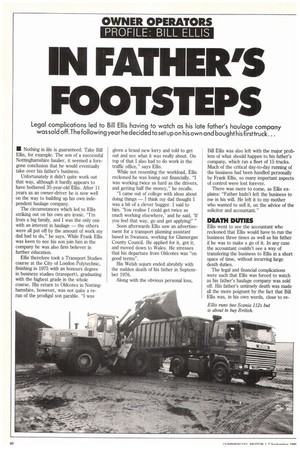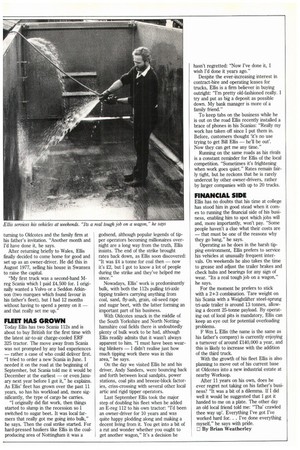IN FATHER'S FOOTSTEPS
Page 30

Page 31

If you've noticed an error in this article please click here to report it so we can fix it.
Legal complications led to Bill Ellis having to watch as his late father's haulage company wassold off.Thefollowing year he decided to setup on his own and bought his firsttruck...
• Nothing in life is guaranteed. Take Bill Ellis, for example. The son of a successful Nottinghamshire haulier, it seemed a foregone conclusion that he would eventually take over his father's business.
Unfortunately it didn't quite work out that way, although it hardly appears to have bothered 35-year-old Ellis. After 11 years as an owner-driver he is now well on the way to building up his own independent haulage company.
The circumstances which led to Ellis striking out on his own are ironic. "I'm from a big family, and I was the only one with an interest in haulage — the others were all put off by the amount of work my dad had to do," he says. While Frank Ellis was keen to see his son join him in the company he was also firm believer in further education.
Ellis therefore took a Transport Studies course at the City of London Polytechnic, finishing in 1975 with an honours degree in business studies (transport), graduating with the highest grade in the whole course. His return to Oldcotes in Nottinghamshire, however, was not quite a rerun of the prodigal son parable. "I was given a brand new lorry and told to get out and see what it was really about. On top of that I also had to do work in the traffic office," says Ellis.
While not resenting the workload, Ellis reckoned he was losing out financially. "I was working twice as hard as the drivers, and getting half the money," he recalls.
"I came out of college with ideas about doing things — I think my dad thought I was a bit of a clever bugger. I said to him. 'You realise I could get twice as much working elsewhere,' and he said, 'If you feel that way, go and get applying!' " Soon afterwards Ellis saw an advertisement for a transport planning assistant based in Swansea, working for Glamorgan County Council. He applied for it, got it, and moved down to Wales. He stresses that his departure from Oldcotes was "on good terms".
His Welsh sojum ended abrubtly with the sudden death of his father in September 1976.
Along with the obvious personal loss, Bill Ellis was also left with the major problem of what should happen to his father's company, which ran a fleet of 15 trucks. Much of the critical day-to-day running of the business had been handled personally by Frank Ellis, so many important aspects of control were lost forever.
There was more to come, as Ellis explains: "Father hadn't left the business to me in his will. He left it to my mother who wanted to sell it, on the advice of the solicitor and accountant."
DEATH DUTIES
Ellis went to see the accountant who reckoned that Ellis would have to run the business three times as well as his father if he was to make a go of it. In any case the accountant couldn't see a way of transfering the business to Ellis in a short space of time, without incurring large death duties.
The legal and financial complications were such that Ellis was forced to watch as his father's haulage company was sold off. His father's untimely death was made all the more poignant by the fact that Bill Ellis was, in his own words, close to re turning to Oldcotes and the family firm at his father's invitation. "Another month and I'd have done it, he says.
After returning briefly to Wales, Ellis finally decided to come home for good and set up as an owner-driver. He did this in August 1977, selling his house in Swansea to raise the capital.
"My first truck was a second-hand Mreg Scania which I paid £4,500 for. I originally wanted a Volvo or a Seddon Atkinson (two marques which found favour in his father's fleet), but I had 12 months without having to spend a penny on it — and that really set me up."
FLEET HAS GROWN
Today Ellis has two Scalia 112s and is about to buy British for the first time with the latest air-to-air charge-cooled ERF 325 tractor. The move away from Scania was not prompted by any bad experiences — rather a case of who could deliver first. "I tried to order a new Scania in June. I needed it on the road at the beginning of September, but Scania told me it would be December at the earliest — or even January next year before I got it," he explains. As Ellis' fleet has grown over the past 11 years, so has his workload and, more significantly, the type of cargo he carries.
"I originally did flat work, then things started to slump in the recession so I switched to sugar beet. It was local farmers that really got me going into bulk," he says. Then the coal strike started. For hard-pressed hauliers like Ellis in the coalproducing area of Nottingham it was a godsend, although popular legends of tipper operators becoming millionaires overnight are a long way from the truth, Ellis insists. The end of the strike brought rates back down, as Ellis soon discovered: "It was £4 a tonne for coal then — now it's 22, but I got to know a lot of people during the strike and they've helped me since."
Nowadays, Ellis' work is predominantly bulk, with both the 112s pulling tri-axle tipping trailers carrying anything from coal, sand, fly-ash, grain, oil-seed rape and sugar beet, with the latter forming an important part of his business.
With Oldcotes smack in the middle of the South Yorkshire and North Nottinghamshire coal fields there is undoubtedly plenty of bulk work to be had, although Ellis readily admits that it wasn't always apparent to him. "I must have been wearing blinkers — I didn't realise just how much tipping work there was in this area," he says.
On the day we visited Ellis he and his driver, Andy Sanders, were bouncing back and forth between local sandpits, power stations, coal pits and breeze-block factories, criss-crossing with several other local artic and rigid tipper operators.
Last September Ellis took the major step of doubling his fleet when he added an E-reg 112 to his own tractor: "I'd been an owner-driver for 10 years and was quite happy plodding along and making a decent living from it. You get into a bit of a rut and wonder whether you ought to get another wagon," It's a decision he hasn't regretted: "Now I've done it, I wish I'd done it years ago."
Despite the ever-increasing interest in contract-hire and operating leases for trucks, Ellis is a firm believer in buying outright: "I'm pretty old-fashioned really. I try and put as big a deposit as possible down. My bank manager is more of a family friend."
To keep tabs on the business while he is out on the road Ellis recently installed a brace of phones in his Scanias: "Really my work has taken off since I put them in. Before, customers thought 'it's no use trying to get Bill Ellis — he'll be out'. Now they can get me any time."
Running on the same roads as his rivals is a constant reminder for Ellis of the local competition. "Sometimes it's frightening when work goes quiet." Rates remain fairly tight, but he reckons that he is rarely undercut by other owner-drivers, rather by larger companies with up to 20 trucks,
FINANCIAL SIDE
Ellis has no doubts that his time at college has stood him in good stead when it comes to running the financial side of his business, enabling him to spot which jobs will and, more importantly, won't pay. "Some people haven't a clue what their costs are — that must be one of the reasons why they go bang," he says.
Operating as he does in the harsh tipping environment, Ellis prefers to service his vehicles at unusually frequent intervals. On weekends he also takes the time to grease and adjust the trailer brakes and check hubs and bearings for any sign of wear. "Its a real tough job on a wagon," he says.
For the moment he prefers to stick with a 2+3 combination. Tare weight on his Scania with a Weightlifter steel-sprung tri-axle trailer is around 13 tonnes, allowing a decent 25-tonne payload. By operating out of local pits is mandatory, Ellis can keep an eye out for potential overloading problems.
F Wm L Ellis (the name is the same as his father's company) is currently enjoying a turnover of around £140,000 a year, and this is likely to increase with the addition of the third truck.
With the growth of his fleet Ellis is also planning to move out of his current base at Oldcotes into a new industrial estate at nearby Worksop.
After 11 years on his own, does he ever regret not taking on his father's business? "It was a bit of a dilemma. If I did well it would be suggested that I got it handed to me on a plate. The other day an old local friend told me: "Tha' crawled thee way up'. Everything I've got I've worked hard for. . . I've done everything myself," he says with pride.
By Brian Weatherley
















































